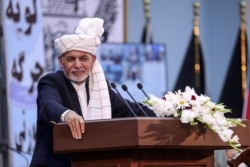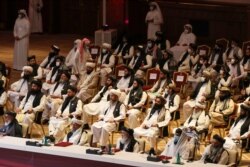Human rights groups have hailed the enactment of a new law in Afghanistan that will, for the first time, include mothers' names on their children's birth certificates and identification cards.
Afghan President Ashraf Ghani signed the reform into law Thursday. It is being lauded as a "major victory" for Afghan women and rights campaigners, who have long fought for the change to promote gender equality in the country.
"Based on this presidential decree, the mother's name is officially included in the national identity cards, along with other personal details," Ghani's spokesman tweeted Friday.
Until now, only fathers were required to have their names printed on their children's identity cards in the South Asian nation, where critics say discrimination against women remains "severe and pervasive."
Speaking about female family members or using their names in public is traditionally not appreciated in the conservative Afghan society.
"Good news on women's rights doesn't happen every day in Afghanistan! So, let's celebrate the activists who fought long and hard for this important and long overdue change," tweeted Heather Barr of Human Rights Watch.
The New York-based rights group in a statement underscored the importance of the reform, saying it will have "important real-life consequences" and make it easier for women to obtain education, health care, and passports and other documentation for their children, and to travel with their children.
"It will be especially significant for women who are widowed, divorced, separated or dealing with abusive partners," Human Rights Watch said.
Talks with Taliban
The historic legislation comes amid ongoing talks in Qatar between an Afghan government delegation and representatives of the Taliban to negotiate an end to years of Afghan war.
Many Afghan women fear that their rights could be rolled back in the negotiations with the Islamist insurgent group. Rights activists have pressed Kabul to ensure that a final arrangement with the Taliban fully respects women's rights.
"This new law is a confidence boost and reminder of the many battles Afghan women's rights activists have fought — and won — since 2001," HRW stated.
The Taliban imposed strict Islamic rule in Afghanistan in the late 1990s when they were in control of most of the war-hit country. The radical group banned women from outdoor activities and girls from education.
A U.S.-led foreign military coalition invaded the country nearly 19 years ago and dislodged the Taliban from power for sheltering al-Qaida leaders.
Some progress for women
Afghan women are said to have made advances in all fields since 2001, with assistance from foreign donors. Millions of girls go to school now, and women have joined media, the government and the national parliament.
But critics say the gains are largely confined to major urban centers and have not trickled down to rural Afghanistan, citing corruption in government institutions.
The 21-member Afghan government team negotiating peace with the Taliban in Qatar includes three women. The government maintains its negotiators have been tasked to discuss peace without compromising on the gains the country has made in recent years.
Thursday's Afghan law on women came the same day the U.S. Embassy in Kabul warned American citizens that extremists are plotting attacks, primarily to target women.
An embassy security alert posted on its website said that "extremist organizations continue to plan attacks against a variety of targets in Afghanistan, including a heightened risk of attacks targeting female government and civilian workers, including teachers, human rights activists, office workers and government employees."
The statement issued Thursday did not give further details. Washington has warned in recent weeks that terrorist groups such as Islamic State are trying to sabotage the Afghan peace process brokered by the United States.
"We have no intention to carry out such attacks," Taliban spokesman Zabiullah Mujahid told VOA, when asked for his reaction to the U.S. warning.













